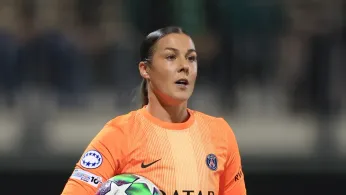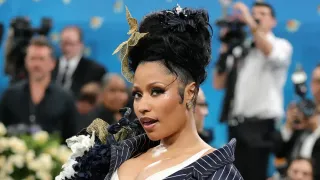
5 hours ago
Lioness Mary Earps Steps Out: Football’s Fierce Guardian Celebrates Love and Authenticity
READ TIME: 3 MIN.
Mary Earps—England’s indomitable goalkeeper, World Cup hero, and reigning BBC Sports Personality of the Year nominee—has never shied away from the spotlight when it comes to her prowess on the pitch . But her latest public revelation—that she’s “happy” and thriving in a relationship with another woman—has kicked off a very different kind of celebration within the LGBTQ+ community and the world of sports .
Earps shared the news with a sincerity and joy that has resonated deeply, especially among queer fans and athletes who know all too well the challenges of being out in the world of elite sports . In recent interviews, Earps has spoken candidly about finding happiness and support in her personal life, stating: “I’m really happy. I’m in a good place and I have wonderful people around me.” .
For LGBTQ+ athletes, visibility isn’t just about being seen—it’s about being believed, celebrated, and understood. Earps’s openness arrives at a time when queer representation in football is still making slow but vital progress, especially in women’s leagues . Her announcement adds her voice to a growing chorus of players, including the likes of Magda Eriksson and Pernille Harder, who have made their relationships public and helped normalize queer love in sport .
Earps’s story is more than a heartwarming moment—it’s a beacon for fans and young athletes. The England Lioness’s ability to stand tall, both literally and figuratively, sends a message that it’s possible to excel at the highest level without hiding who you are . In a world where men’s football still has a glaring lack of out players, Earps’s openness in the women’s game highlights both the progress and the ongoing work needed for full inclusivity.
Mary Earps’s announcement rippled far beyond the football community, igniting conversations across LGBTQ+ media and social networks. The outpouring of support—fans reposting her interview clips and sharing messages of solidarity—illustrates the hunger for authentic queer stories in sport .
For queer audiences, Earps’s “happy” narrative is a welcome contrast to the all-too-familiar tales of struggle and adversity. Her story is one of joy and belonging, centered on the ability to thrive both personally and professionally. It’s a reminder that LGBTQ+ people deserve not only acceptance but happiness without apology.
Earps herself embodies the kind of playful, unapologetic energy that resonates with fans: tough on the pitch, soft in her personal life, and completely herself. As she explained in her own words, “I’m in a really happy place and I’m very grateful for the people who support me every day.” . For many LGBTQ+ readers, these words are more than a personal update—they’re a rallying cry for visibility, self-love, and community.
If Earps’s revelation feels like a watershed, it’s because it comes at a moment of growing momentum for queer athletes. From the Women’s Super League to international tournaments, more players are stepping forward and sharing their truths . Each time a star like Earps shares her story, it chips away at stereotypes and makes space for others to do the same.
But the work isn’t done. The football world, and sports in general, still present barriers—homophobia, transphobia, and institutional inertia all linger. Earps’s joyful openness challenges these obstacles and calls for more action: better support systems, more inclusive policies, and a media landscape that celebrates queer love stories of all kinds .
As Pride season swells and fans don their rainbow kits in Earps’s honor, her story is a reminder: when LGBTQ+ athletes live openly, the world becomes a little safer and a lot more joyful. Football’s fierce guardian has, once again, made a save—this time off the pitch, for every queer kid watching at home.






